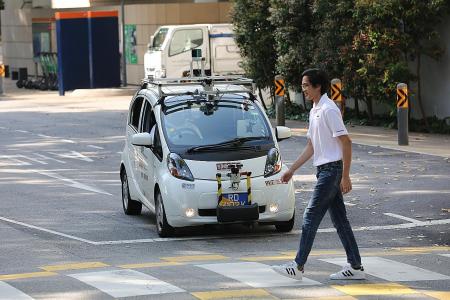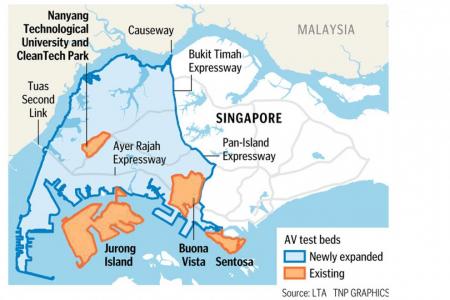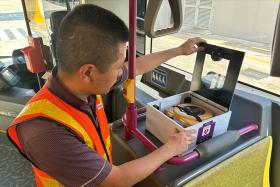Western Singapore designated as test area for self-driving vehicles
Public roads in western Singapore to be test bed for autonomous vehicles
All of western Singapore will become a test bed for self-driving vehicles as the move towards autonomous mobility goes into overdrive.
This sets the stage for companies to test their autonomous vehicles (AVs) in neighbourhoods such as Bukit Timah, Clementi and Jurong, with the expanded test bed covering more than 1,000km of public roads.
The expansion is expected to take place gradually over the next several years and public safety will continue to be the top priority, said Senior Minister of State for Transport Janil Puthucheary yesterday.
Public acceptance of self-driving cars was key, said Dr Janil, at the Intelligent Transport Systems World Congress, and this could be eroded if accidents were to occur.
The Land Transport Authority (LTA) said it decided to expand the test bed as companies wanted the chance to conduct tests "in a wider range of traffic scenarios and road conditions".
"This will support the robust testing of AVs' capabilities to provide inter-town services and longer-haul journeys in a safe manner, and pave the way for the planned pilot deployment of AVs in the early 2020s," it added.
In 2017, the Government identified Punggol, Tengah and the Jurong Innovation District as areas where residents and workers can take self-driving buses and shuttles for their first- and last-mile commutes, under a pilot programme.
The LTA plans to engage community leaders before the tests.
All AVs will have to display prominent decals and have markings to ensure easy identification by other road users.
They will have to go through a thorough safety assessment before they are approved for on-road trials.
In addition, they must continue to have a qualified safety driver "who is ready to take over immediate control of the vehicle should the need arise".
They must also be covered by third-party liability insurance.
The trials can be expanded after the AVs pass stringent competency tests, said the LTA.
The LTA started facilitating on-road AV trials in 2015. Current test sites include Buona Vista, Jurong Island and Nanyang Technological University (NTU) in western Singapore, as well as Sentosa. Groups such as ComfortDelGro, ST Engineering and NTU have been running the tests.
Dr Janil said that while AV technology remains some years from large-scale deployment, significant investment has been going into the area.
Citing the results of a study by research firm PitchBook, Dr Janil said that more than US$10 billion ($13.6 billion) was invested in the AV space last year. This represents a tenfold increase from five years ago.
"The capital, the funding is demonstrating that perhaps our vision, our interest, our commitment to pursue this space is not unfounded," said Dr Janil.
Many initiatives are underway to grow the AV space here, noted Dr Janil. For example, the LTA is currently developing tests to evaluate an AV's ability to operate in a fully autonomous manner without an on-board safety operator.
Dr Janil said Singapore is particularly excited about the shift in focus of AV research towards larger capacity vehicles such as buses and trucks, as well as platforms for last-mile logistics deliveries.
"These shuttles, trucks, buses could quite significantly transform mobility in Singapore, enabling more efficient, dynamically routed or on-demand form of shared transport."
Read: LTA signs MOU to prepare bus captains for self-driving buses
Get The New Paper on your phone with the free TNP app. Download from the Apple App Store or Google Play Store now



